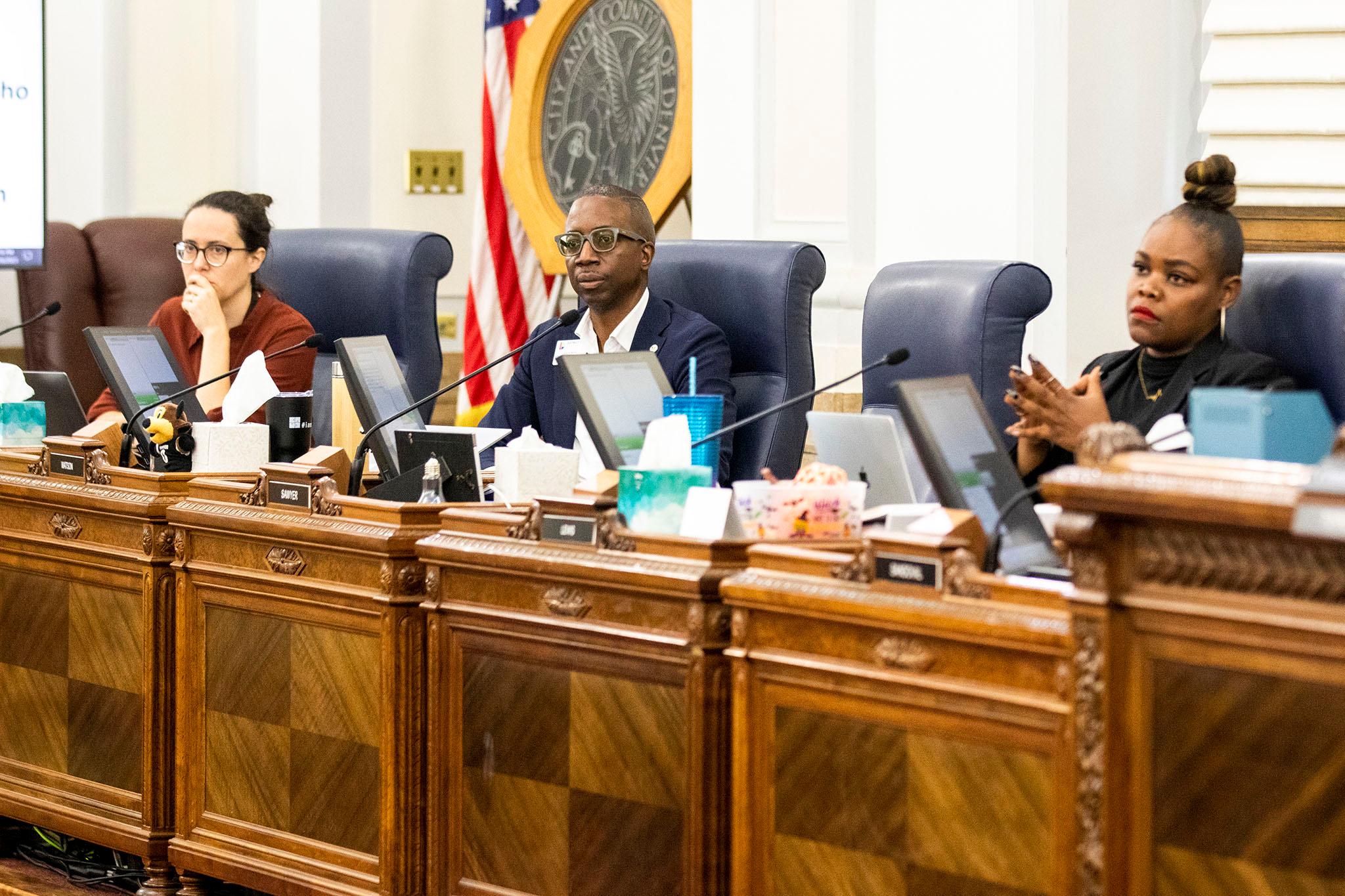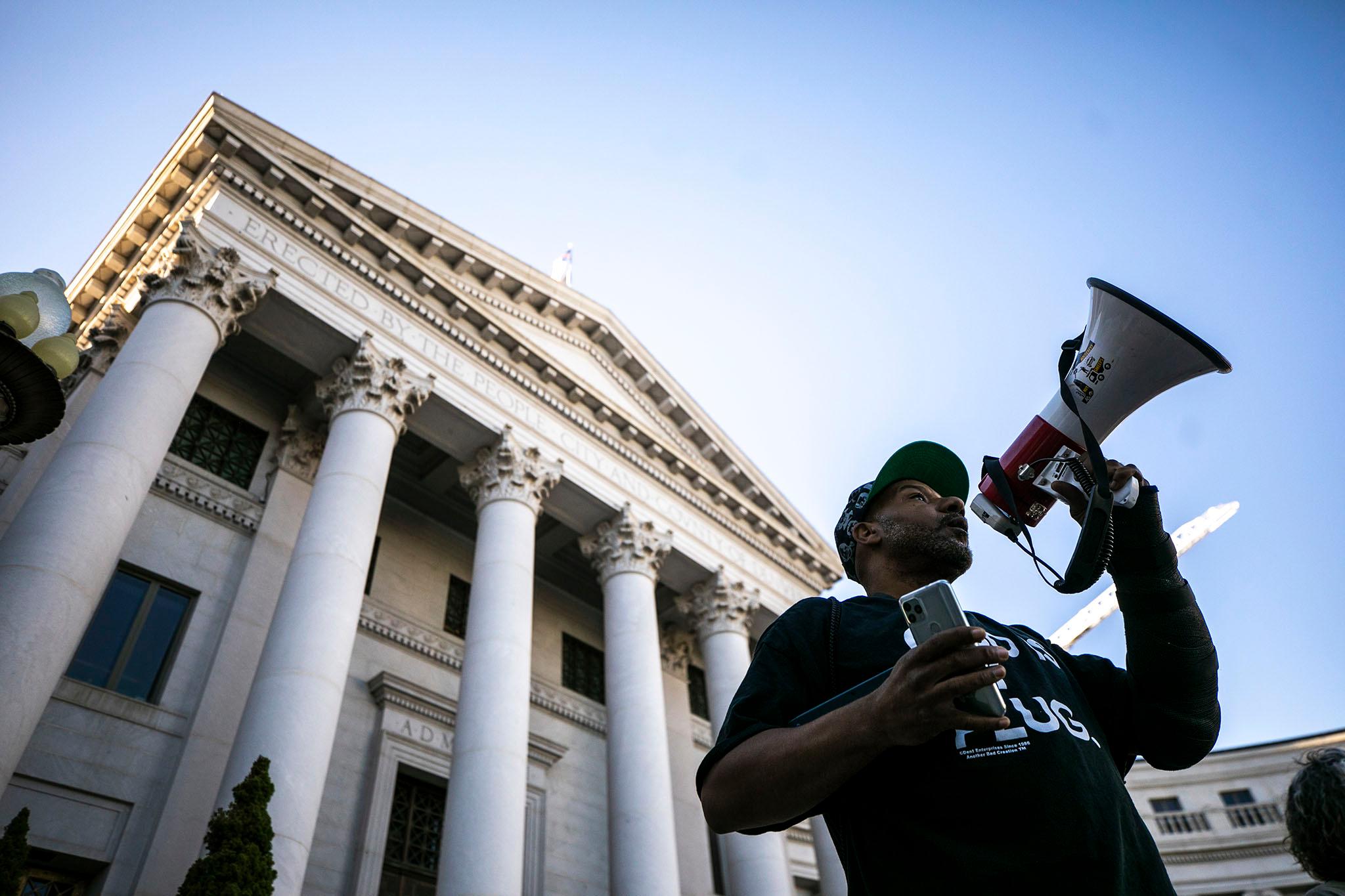Outside the City and County Building, unhoused city residents shared stories about their experiences living on the streets. Along with activists, they called on Mayor Mike Johnston to stop the encampment sweeps and asked for more stable housing beyond pallet shelters and tiny homes. They wore adhesive bandages on their faces and clothes, asking for more than what they called a "Band-Aid solution."
"We're not putting people just indoors, we want real housing, we want real solutions," said Housekeys Action Network and homeless activist V Reeves, standing on the steps of the City and County Building.
Inside that building, City Councilmembers grilled Cole Chandler, Johnston's senior advisor on homelessness, about the Mayor's agenda.
They ultimately voted ten to three for the fourth time to approve the emergency declaration regarding homelessness. But since the resolution passed for the first time in July, questions about the program and no-votes on the declaration have grown, and some Councilmembers have indicated they could not guarantee their support next month.
"I'll be honest with you, you're slowly losing me," said Councilmember Shontel Lewis, who voted yes on the declaration Monday night. "I'm struggling because it's really really important to me that we get this right, but I don't know that we're moving slow enough to get this right."
Councilmembers Flor Alvidrez, Stacie Gilmore and Amanda Sawyer voted no on the emergency declaration, which lets Johnston divert staff across apartments, have more flexibility with spending and speed up response efforts. Others asked plenty of questions about the mayor's ongoing mission.

Three months into Mayor Mike Johnston's term as mayor, Councilmembers and activists are asking a lot of questions about his administration's homelessness initiative.
The program, House1000, aims to get 1,000 people off the streets and into noncongregate shelter and on the path to permanent housing by the end of 2023.
The effort is well underway, with a number of funding requests moving through City Council, plans for initial shelter and tiny home sites and lots of community meetings. The city has also begun trash services for some encampments. At the end of September, city officials tested the model for the first time, sweeping the encampment near the Governor's Mansion and moving around 70 of the people living there into individual shelters.
But other encampment residents have not been so lucky, with many cleared without a place to go. Meanwhile, other sweeps have continued, without offers of housing. The city has justified those sweeps saying they impeded the right of way, or posed safety and public health risks. For some homeless activists, long opposed to sweeps, it means the city should change its approach.
Housing advocates said they want to see more long-term housing and the end to sweeps without solutions.
Activists called on the city to stop what they called "soft sweeps," where people are told to leave by the city citing right of way or safety concerns. Denverite reported earlier this month that a group of people had been told to move four times in four days.
"This is really concerning, especially because of the increased risks that come along with encampment sweeps," said Megan Davenport, the CEO of the Gathering Place, a nonprofit that runs shelters in the city, at Council's public comment session Monday.

She said she has seen "soft sweeps" outside one of their shelters. "What's going on right now is not hitting the mark," Davenport said.
Housekeys organizer Terese Howard asked the Johnston administration to follow sweep protocols by providing people with outreach teams, sanitation resources and time to move their belongings.
"Really what we're asking is some minimal, minimal changes," she said.
In a letter to Johnston, Housekeys activists asked for a number of other changes to the city's approach.
Advocates criticized the Mayor for counting previously acquired housing units, such as hotels, as part of the 1,000 units in the House1000 effort. They said they want to see a stronger focus on long-term shelter that "any city official would be content to move into," rather than the temporary pallet shelters. The letter also criticized the city's two-week timeline for counting people as having a "housing outcome" under the House1000 program.
Activists also expressed concern that the House1000 effort prioritizes people living directly on the street, as opposed to other people experiencing homelessness.
"The 1000 units of housing created under the State of Emergency should be given first to the most vulnerable people, not the most visible," Housekeys representatives wrote in a letter of six demands to the Mayor. "Giving people housing just because they happen to be at a visible downtown encampment is an ineffective and ludicrous way to select people for housing opportunities. People who are elderly, sick, disabled, and families with children must be prioritized."
Housekeys activists said they met with Johnston last week, and that he said he would continue to meet with the group but did not commit to specific requests. Denverite has reached out to Johnston for comment.
During Monday's city council meeting, Chandler said the administration is working with the group.
"We're working on follow ups to specific items, [we] just want you to know we're taking that very seriously," he said.

While activists voiced their concerns at the rally, Councilmembers had a number of their own questions for the administration.
They wanted to know how the city is measuring success, how the city is tracking data, the status of environmental studies and efforts to work with landlords and what Johnston's long-term vision looks like.
"We're moving really fast and cutting corners on this," said Councilmember Amanda Sawyer, a consistent no-vote on the emergency declaration since first introduced in July. "I keep trying to get to a yes... I'm still not there four months in."
Alivdrez and Gilmore joined as no-votes with concerns around transparency. Other Councilmembers told Chandler they were a yes-vote this month, but that they could not guarantee continued support in the future.
"I am thirsty for the vision, and I am having a really hard time finding it," Lewis said. Council President Jamie Torres later said she agreed with Lewis.

Other Councilmembers, including Chris Hinds, voiced support for House1000 and the efforts so far. Many of the recent sweeps have taken place in Hinds' District 10. "I want to thank you for the work that you're doing," he said. "I'm committing to you that I'm a continued supporter."
The emergency declaration ultimately passed, but Monday was not the first time City Council pushed back against the Mayor's office. Earlier this month, Council unanimously voted down a $6.4 million contract with Colorado Coalition for the Homeless for encampment outreach services, out of concerns about duplicating services. Johnston said his office would take more time to work on a different contract.
Denverite reporter Kevin Beaty contributed reporting.
Correction: The program, House1000, aims to get 1,000 people off the streets by the end of 2023. An earlier version had the wrong date.













